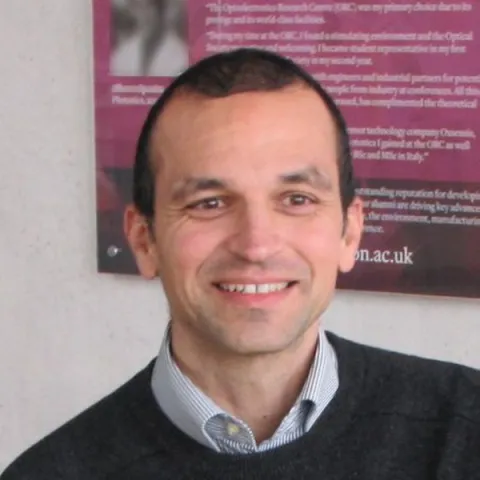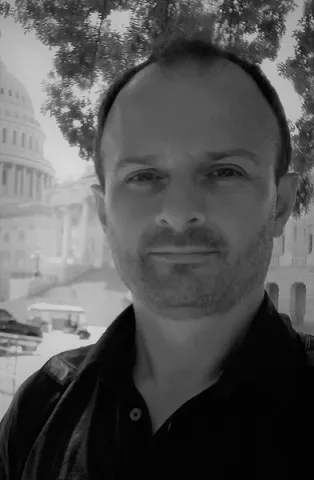Project overview
Internet communications have effected a massive transformational effect in modern societies over the past few decades, affecting all aspects of modern life, from commerce and healthcare through politics to education and entertainment. Optical communication technologies have played a decisive role and remain central to this revolution. Wavelength division multiplexing allows the transmission of hundreds of terabits per second over a single mode fibre and has enabled wavelength routing, where the optical frequency, rather than the physical fibre path, determines the routing of a signal in a network. The relentless growth in communication traffic necessitates an effective use of network resources, and in response, modern optical networks increase in complexity and require dynamic allocation of their resources.
The ultimate objective of this project is to enable a next generation reconfigurable add-drop de/muliptlexer that will allow re-allocation of the signal wavelength through all-optical wavelength conversion. In order to achieve this, juNIPeRS will study silicon-rich silicon nitride as a CMOS-compatible optical nonlinear material platform and will exploit its unique characteristics to implement integrated devices with unprecedented nonlinear performance.
juNIPeRS will follow a vertical research path, that will include material optimisation and fabrication of photonic integrated systems, device design and optimisation, system integration, and demonstration and testing in a communications environment. Specifically, juNIPeRS will:
- Develop low-loss, dispersion engineered nonlinear waveguides that will form the core of wavelength converting systems.
- Optimise couplers for efficient coupling of light between these integrated components and fibre optic systems.
- Demonstrate integrated wavelength converters and phase-sensitive amplifiers, the operation of which will be independent of the polarisation of the incoming signal.
- Implement multi-layered photonic systems integrating both linear (e.g. switches) and nonlinear components (e.g. wavelength converters).
With the development of the new technological platform, the ambition of juNIPeRS is to facilitate a shift in the design of flexible optical networks, where practical integrated photonic components will be used for the manipulation of the optical frequencies. The new material platform is expected to have important implications in other areas of nonlinear optics outside communications, and the investigators will take active steps to promote it.
juNIPeRS brings together academic groups and key industrial partners who are best placed to critically appraise the commercial relevance of the new technology and guide its development. The project will train a new generation of highly qualified optical engineers and will contribute to the health and sustainability of the UK photonics sector.
The ultimate objective of this project is to enable a next generation reconfigurable add-drop de/muliptlexer that will allow re-allocation of the signal wavelength through all-optical wavelength conversion. In order to achieve this, juNIPeRS will study silicon-rich silicon nitride as a CMOS-compatible optical nonlinear material platform and will exploit its unique characteristics to implement integrated devices with unprecedented nonlinear performance.
juNIPeRS will follow a vertical research path, that will include material optimisation and fabrication of photonic integrated systems, device design and optimisation, system integration, and demonstration and testing in a communications environment. Specifically, juNIPeRS will:
- Develop low-loss, dispersion engineered nonlinear waveguides that will form the core of wavelength converting systems.
- Optimise couplers for efficient coupling of light between these integrated components and fibre optic systems.
- Demonstrate integrated wavelength converters and phase-sensitive amplifiers, the operation of which will be independent of the polarisation of the incoming signal.
- Implement multi-layered photonic systems integrating both linear (e.g. switches) and nonlinear components (e.g. wavelength converters).
With the development of the new technological platform, the ambition of juNIPeRS is to facilitate a shift in the design of flexible optical networks, where practical integrated photonic components will be used for the manipulation of the optical frequencies. The new material platform is expected to have important implications in other areas of nonlinear optics outside communications, and the investigators will take active steps to promote it.
juNIPeRS brings together academic groups and key industrial partners who are best placed to critically appraise the commercial relevance of the new technology and guide its development. The project will train a new generation of highly qualified optical engineers and will contribute to the health and sustainability of the UK photonics sector.
Staff
Lead researchers
Other researchers
Collaborating research institutes, centres and groups
Research outputs
Marçal Blasco-Solvas, Berta Fernández-Vior, Jad Sabek, Adrián Fernández-Gávela, Thalia Dominguez Bucio, Frederic Gardes, Carlos Dominguez Horna & Joaquin Faneca,
2024, Journal of Lightwave Technology, 42(17), 6019-6027
Type: article
Hao Liu, Kyle Bottrill, Valerio Vitali, Iosif Demirtzioglou, Martin Skenderas, Nura Adamu, Cosimo Lacava, Xingzhao Yan, Mehdi Banakar, Ying Tran, Martin Ebert, James Le Besque, Callum Littlejohns, David Thomson & Periklis Petropoulos,
2024
Type: conference
Valerio Vitali, Kyle R.H. Bottrill, Thalia Dominguez Bucio, Hao Liu, José Manuel Luque-González, Francisco Jurado Romero, Alejandro Ortega-Moñux, Glenn Churchill, James Gates, James A. Hillier, Nikolaos Kalfagiannis, Daniele Melati, Jens H. Schmid, Ilaria Cristiani, Pavel Cheben, J. Gonzalo Wangüemert-Pérez, Íñigo Molina-Fernández, Frederic Gardes, Cosimo Lacava & Periklis Petropoulos,
2024
Type: conference
Frederic Gardes, Thalia Dominguez Bucio, Valerio Vitali, Hao Liu, Jose Manuel Luque-Gonzalez, Francisco Jurado Romero, Alejandro Ortega-Monux, Glenn Churchill, James Gates, James Hillier, Nikolaos Kalfagiannis, Daniele Melati, Ilaria Cristiani, Jens H. Schmid, Pavel Cheben, J. Gonzalo Wanguëmert-Pérez, Inigo Molina-Fernandez, Cosimo Lacava & Periklis Petropoulos,
2024
DOI: 10.1117/12.3025186
Type: conference
Valerio Vitali, Thalía Domínguez Bucio, Hao Liu, José Manuel Luque-González, Francisco Jurado-Romero, Alejandro Ortega-Moñux, Glenn Churchill, James C. Gates, James Hillier, Nikolaos Kalfagiannis, Daniele Melati, Jens H. Schmid, Ilaria Cristiani, Pavel Cheben, Juan Gonzalo Wangüemert-Pérez, Íñigo Molina-Fernández, Frederic Gardes, Cosimo Lacava & Periklis Petropoulos,
2024, Photonics Research, 12(3), A1-A10
DOI: 10.1364/PRJ.506691
Type: article

